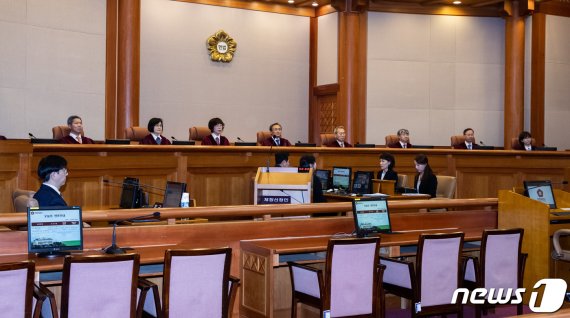
Korean Court Questions Constitutionality of Crypto Regulations
Today the South Korean government fielded fierce debate in court over whether their restrictive reaction to the crypto craze in late 2017 violated the Constitution of the Republic of Korea.
Claimants in an ongoing case in Constitutional Court filed by Heechan Chung state that the government’s countermeasures against the speculation of cryptocurrency, leading to a staggering inflation of cryptocurrency values in the country known as ‘kimchi premium’ violated the freedom of the people and were unconstitutional.

In December 2017, the government issued a constitutional appeal for the purpose of preventing speculation in the cryptocurrency market, and announced special measures centering around the then-common virtual-name accounts issued by banks that were linked with crypto exchanges as fiat on ramps and off ramps. With the special measure came the requirement that exchanges use real-name accounts from approved domestic banks.
An interesting aspect of this case was that the attorney handling the claimant’s case referred to cryptocurrencies as ‘crypto-property’, whereas the defendant’s attorneys referred to them as ‘virtual currency’ as they argued about the constitutionality of the cryptocurrency real-name system.

News 1
The claimant said, “[Crypo-properties owned by claimants have exchange value, and they have objective methods to check the quantity being held and security of transactions. As a result, property rights have been violated.]”
“[The restriction on the exercise of property rights should have been subject to the principle of law retention… Is there a reason for the case to be treated differently?]”
The claimant further called for appropriate and proper regulation for cryptocurrencies, but the real-name system to trade cryptocurrencies in Korea is unprecedented anywhere else in the world. He appeared to see the countermeasure as an undue knee-jerk reaction that was poorly thought out and executed.
Oojin Mudgett from BCW, a blockchain and DLT consulting firm, states that “if you’re digitizing physical assets, then those tokens represent the deed to the asset,” which could potentially be seen as property, “but if it’s just about shitcoins on an exchange, they would be taxed under capital gains tax law,” which suggests that they would not be seen as property.
The FSC of Korea, which was the commission responsible for meting out the regulation, reasserted their justification and reaffirmed that the move was suitable to counter the dramatic speculative market.
The government agents said, “[The risk of money laundering is very high in the case of virtual currencies. Without the real-name accounts, it would be possible for direct and non-bank account deposits from third parties. It would then be possible to withdraw fiat.]”
“[In regard to infringement of property rights, the countermeasures only incurred a loss (or reduction) of opportunity to acquire profits and goods.]”
The argument took a turn towards the end when it was pointed out that the government’s countermeasures are neither legal nor legitimate because they are not guaranteed by any government entity to be implemented. Therefore, claiming violations of the principle of law retention, not the exercise of public power, is invalid, especially when it can be seen that the measures were taken based on the Act on Reporting and Utilization of Specific Financial Transaction Information and Banking Act.
The Court is expected to make a final conclusion based on the discussion in the near future.




